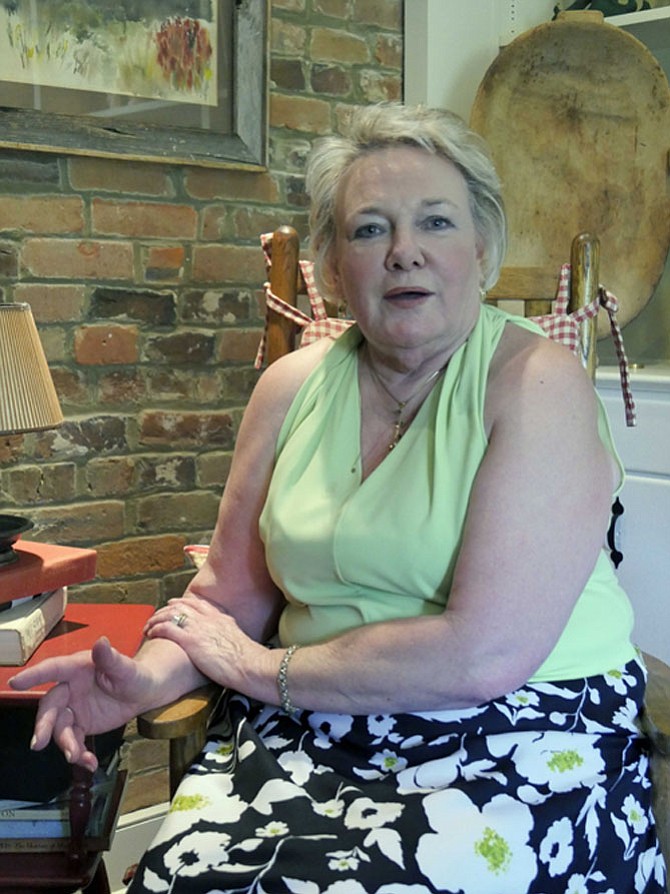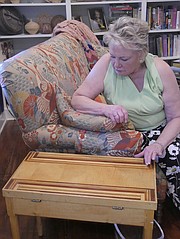Ruthi Postow Birch sits in the den of her historic house on S. St. Asaph Street relating stories of her life in rural Alabama that inspire her recently-released memoir, “How to Build a Piano Bench: Lessons for Success from a Red-Dirt Road in Alabama.” Photo by Shirley Ruhe.
It all started with the piano bench. Ruthi Postow Birch was about 11 or 12 living in rural Alabama where she says her mama wanted her to take piano lessons to be popular at parties. So her father bought an old piano with a crumbling piano bench, which her daddy said he would repair.
Her momma said, "You don't know how to build a piano bench," but he said, "Just do the next right step and then the next step and if you come on something you can't do, just find someone who can do it." It took him three years including the pieces that he painstakingly inlaid on the top.
Birch says what she learned from her daddy is to take one step at a time and to simplify. "Do the next right step. Poor people had to solve their problems, had to handle things simply." Birch grew up on a red dirt road in Alabama and her daddy kept saying, "Get off Petain Street; get your education." She said her daddy told her what to do but her momma showed her how.
Birch's recently-released memoir, "How to Build a Piano Bench: Lessons for Success from a Red-Dirt Road in Alabama," chronicles the life lessons she learned and how she applied them to build a career in business development in downtown D.C.
Birch says the first interview is like the first date; it all starts with the interview. Her favorite interview was a sweet little girl that the HR person, a pretty stiff human being, sent to an interview for a bank teller position. She got a second interview but when the HR person caught Birch afterwards, he looked shaken. "The girl had said, 'I claim this job in the name of Jesus.' Well, turns out she got the job. Her momma had always told her if Jesus wants you to get it you will."
Birch says her daddy was a rogue and a womanizer, charismatic with blue eyes, tall, funny. “The women all loved him. My mother had character, but my daddy was a character." She and her daddy were joined at the hip until elementary school. "When I was a baby I did everything with him.“ She continued, "The worst thing my momma could say about me was 'you're just like your daddy.' I did not want to be that person, but when he went into a room, he lit it up."
But when she became more of an adult, she grew to appreciate him. "He was complicated.” He was a tugboat captain and when he came into port, he would do a prizefight. She says she always knew he was a very smart man. But he was frustrated because he resented the fact that he couldn't make something of himself. "He died at 90 something. He used it all up.” Birch says she was the baby "and the day he died I ceased to be the perfect person."
Birch started writing her book 12-13 years ago. She said, “I had all this down home, blue collar wisdom I had been sharing with people and I was going crazy. It had to be shared." So she just started writing stories. She would come home from work to her place in Georgetown and start writing at 2 p.m. "I wrote every day. Once I had it chunked up, I put down segments to avoid ADD run amuck with all the 12 chapters. Then I glued them altogether."
She sits in the "middle room" of the nearly block-long garden surrounded by a faintly-tinged pink hydrangea bush and her specialty roses in pots. This is her favorite spot where she sometimes balances her computer on her lap as she works on her next book, a biography of her husband. She now has about 8,000 words about Ron Birch, the first chief of staff to U.S. Sen. Ted Stevens from Alaska. "He was the other guy in a room full of giants. They listened to him." Sometimes she works in what is now her den, the original main room of the house constructed in the 1700s with two subsequent additions in the late 1800s and 1980.
Birch has also written a novel about her mother called EvaMay. It is finished but not published. "Someday I'll come back to it." She explains her mother was a born-again Christian, liberal, opinionated. She had views of right and wrong and “would even stand up to the preacher." Birch said people adored her. "She grew up as the child of divorced parents and was discriminated against. "I guess that's one of the reasons she was so adamantly fair and opposed to segregation. She was the finest person I've ever known."
It took Birch's daddy three years to rebuild the piano bench and he painstakingly inlaid patterned pieces on the top. When Birch quit her career in business development to start her own business and got the advice about how many new businesses fail, she went back to the lessons of her daddy. "Just do it, an outgrowth of what I did, one step at a time." She has the piano bench, now a piece of folk art, displayed in her library, but she said, "I never learned to play the piano."

